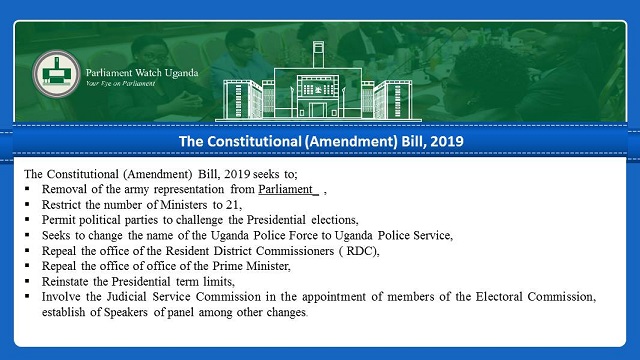
What makes successful laws and why some are easily violated and others upheld
THE LAST WORD | ANDREW M. MWENDA | This week, I watched a 2013 video clip of Prof. Joe Oloka-Onyango talking about constitutionalism in Uganda. In a very eloquent speech, he decried the continued defilement of Uganda’s constitution. With the foresight of a prophet, he predicted the constitution will be amended to remove age limits as well. He argued, and again correctly, that there is (and there cannot be) a Muhoozi Kainerugaba project. The only project, he said, was a (President Yoweri) Museveni project. Museveni will replace Museveni as president, he added, and the crowd cheered in loud admiration.
I believe that there is too much moralising and very little analysis in Uganda’s politics. And Onyango, not just a professor of law but one with a good grounding in political economy, did too much moralising. Only his predictions, themselves steeped in sentimentalism, came close to analysis. Indeed, Onyango said he has correctly predicted the amendment of the constitution to remove term limits and that he was predicting another amendment to remove age limits. These predictions are based on Onyango’s intuitive analysis of the politics of Uganda, analysis he divorced from his comments on constitutionalism at the seminar.
I consider myself a realist, and I therefore approach politics from that vantage point. Constitutions are political documents and therefore their provisions will stand and/or fall as a result of political decisions and contests. At root, no constitution can protect itself based purely on what is written in it. Rather it is the balance of political power among different contending social forces and economic interests that make its provisions hold or fail. If there is no political capacity to force those holding power to honour its provisions, the constitution itself will not hold them to account.
Of course, there are rare political circumstances when an individual leader does, out of moral determination, honour the letter and spirit of a constitution. One such leader was Nelson Mandela in South Africa. But these cases are rare, and at any rate, immediately new leaders come to power, they reverse things. The greatest safeguard of a constitution therefore is not in the ideals it states but in the politics that accompany it and define it.
Thus, for a constitutional provision with serious political implications to stand, it must reflect political reality – the balance of power within and among the different contending social forces in the polity. Also, there has to be highly attractive incentives for incumbents to honour its provisions and, equally severe penalties if they violate them. These two pillars – a creative balance between carrots and sticks – are what holds the constitution in place. Thus, one has to look at how power in a given country is organised, exercised, distributed and reproduced to capture its constitutional character.
The 1995 constitution of Uganda stated many ideals that a large section of Ugandan many of our elites aspire to. These ideals included term and age limits. However, they did not reflect the actual allocation and distribution of power in the country. The first test came less than ten years after the constitution was promulgated. The NRM sought to amend it and remove term limits. As a young journalist covering the political maneuverings at the time, I saw how easily the opposition to term limits was neutralised. There simply wasn’t enough political capacity in our politics to halt the schemes of Museveni and his confederates.
But I am very optimistic about Uganda’s future and its aspirations to become a liberal democracy. Yet I am also not sure if liberal democracy is our destination. This is because ideological fads come and go.
I derive my optimism from the American experience. Born in 1776, the USA declaration of independence stated “…that all men (the founders meant ‘all human beings’) are born equal, that they are endowed by their creator with certain inalienable rights, that among these are life, liberty and the pursuit of happiness.” It was an inspiring ideal especially given the time it was made.
Yet this ideal remains elusive. When these American statesmen came to write the constitution in 1787, political reality faced them in the eye. In the negotiations that produced their constitution, they compromised. Only rich white men were given the vote. Poor white men were disregarded. Women were left out. Blacks were kept as slaves. Native Americans were excluded. It took 43 years for the U.S. to grant universal adult suffrage to all white men, 143 years for women to get the vote and 78 years before slaves were emancipated
Even then, slavery was ended through a proclamation by a president using emergency (i.e. dictatorial) powers. America’s liberal democratic institutions: a free press, a vibrant civil society, strong political parties, an independent judiciary and a very assertive congress (parliament) were all powerless to end slavery. On the contrary, all worked to entrench it, even though many journalists, congressmen, judges, and intellectuals felt slavery was backward and a sore on the U.S. conscience.
The 13th amendment was passed in 1867, stating that no one should be denied the right to vote on the basis of their race or previous condition of servitude.” It took another 98 years from 1867 to 1965 before black people were given the vote. And even this was after more than a decade of a civil rights movement. Meanwhile for those 98 years, black people lived under a brutal apartheid regime, some suffering under a cruel “convict leasing” program that was worse than slavery. During this time, native Americans were exterminated in the least reported genocide on earth.
Today, African Americans and other ethnic minorities live under a regime of mass incarceration, hunted by racist police officers for small things like possessing weed. Many are killed almost daily for no other reason but the colour of their skin. But Americans, especially African Americans, have not given up hope in the declaration of independence and/or the constitution. No mainstream politician or intellectual is calling for sanctions against America. They see their country as a human enterprise rife with all the contradictions and joys of that experience.
The point is: constitutions are statements of the ideal. The realisation of those ideals is a political project that can last generations. Uganda is not any different. Some of the ideals we put in our constitution like term limits were premature and did not reflect political reality. However, I think after Museveni leaves power, some aspects of constitutionalism may return. This is because it is unlikely any of his potential successors will carry the same level of historical legitimacy and thus authority as he does.
****
amwenda@independent.co.ug
 The Independent Uganda: You get the Truth we Pay the Price
The Independent Uganda: You get the Truth we Pay the Price




“I believe that there is too much moralising and very little analysis in Uganda’s politics. And Onyango, not just a professor of law but one with a good grounding in political economy, did too much moralising. Only his predictions, themselves steeped in sentimentalism, came close to analysis.”
It’s unbelievable that you find a way to criticise a man for being right. Nine years ago, when Onyango spoke of Uganda already being in a state of constitutional crisis, he was (to anyone paying attention at the time) making a political diagnosis of a country that by then was already showing late stage symptoms of full blown democratic retrenchment. Which adult, in 2013, needed to be reminded of the state-sponsored election violence in 2001 and 2006?Who needed to be reminded of the black mamba paramilitary squads that surrounded the high court and arrested criminal suspects acquitted of their charges by the courts? Who can forget the safe houses into which countlesss politically dissident Ugandans have disappeared? Who doesn’t remember the judicial probes that all but disclosed the presidential hand behind corruption in the police and the UPDF?
Onyango understood well the degree to which power had been personalised in the Uganda of 2013 and made his predictions in the knowledge of a set of political dynamics obvious to anybody who was of sound mind and not motivated to misunderstand where those politics would lead. His prediction contained no appeal to morality, but rather to reason with a firm grounding in the evidence of how he had observed the NRM behave up to that point. He has been vindicated. Which leaves those embarrassed by the accuracy of his claims with nothing to say but to attempt to police the tone in which he made his claims (“Too much moralising! How cringe!”). The respectful thing to do when proved wrong by events is to admit one’s own shortcomings and lack of insight, recognise that one’s opponent was right, and finally (if one is really brave) to adjust one’s theoretical framework to incorporate the opponent’s insights, if not to abandon altogether one’s own faulty framework which has been shown to have no predictive power of any kind.
If you brother Mwenda are a realist, then, there is a thin line between realism and opportunism.
The architects of our current democratic model and its custodians will not dare take a walk in the paths of the villages they hail from without an armed escort. Polemics aside the economy will not hide this misadventure.Minor incidents like the honourable prime minister rescuing an indebted widow from prison surely cleave a bitter feeling of where things began going wrong.
1.The Constitution is not cast in stone that’s why there are provisions for amendment of some clauses.
2, Laws are repealed when they are considered outdated or useless.
3.What drives the repealing or amendments of some sections of the law in Uganda?The laxity in the laws that gives Parliament lots of power while enacting laws.
4.No doubt it did not look good in the eyes of the opposition when the presidential term and age limit was reworked while in NRM, they explored and used the open window that allowed for amendment of some clauses in the constitution.So in the context of law; the lifting of the presidential term limit was just ok after all all the legal procedures were followed.
5.Professors are now being paid 15m they should not be shy to carry out a case study on why Uganda is preforming well despite have a President who has rued for long.
6.Having a stable state in Africa is just by chance there is no guarantee in Uganda that the next President will sustain the Economic, social and political stability that Uganda boasts of now.
7.Kenya ‘s Moi led the country for over 20 years ;there are some school of thought that believe that his long rule later on resulted in Kenya’s constitutional reforms perhaps M7’s stay in power is a blessing in disguise for Uganda’s future reforms in the context that we are lucky that he is dong well in that the next President will just have a walk in the park.